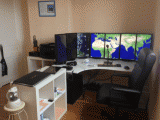Trading rule number 4: only trade when you are on top form

Trading is the most difficult and exhausting activity that I have ever practised. I have "been around the block"; I have been an IT engineer, an adult educator, a University professor, passing through less intellectual jobs such as farm labourer, market tradesman and I could go on. None of my previous experiences prepared me for the demands of the trading profession.
Trading is a mentally exhausting activity
Contents
After a day of trading from 10 am to noon, I am generally mentally exhausted. I practice scalping which is a type of trading that requires intense concentration and a rapid response capability. I can be concentrating for a long time with a finger on the trigger (the mouse), almost holding my breath, to find the best possible entry. I monitor 4 indices in real time (Dow Jones, S&P 500, CAC 40 and Dax 30) in different time units. I must therefore continually scrutinize about twenty charts and analyse common areas of support and resistance. This requires very special mental gymnastics and after a day of intensive trading, I am simply "empty", my brain is completely ready for a reality TV show.
Trading is a stressful activity
Beyond this mental fatigue, trading is an extremely stressful activity because we are constantly in the process of evaluating our decisions in real time. Trading does not lie, it is either good or it isn't. This is its charm, we are fully responsible for our actions, each of our decisions has an immediate impact on our capital. In case of a trading failure, when the situation is difficult to bear, some may collapse psychologically or find a scapegoat (the broker, Ben Bernanke, Mario Draghi, Goldman Sachs... the power of human imagination in these cases has always impressed me) in order to preserve an injured ego. A large part of the stress comes from this psychological state, traders have too great a tendency to "be" their capital, to identify with it, to evaluate themselves as people depending on their trading results. Trading is above all accepting the frustration and your own errors...
A trader is a top-level athlete
To try to limit stress and psychological exhaustion, and therefore play a lasting role, we should not hesitate to see ourselves as high level sportsmen. Everything must be analysed, streamlined with a view to being at the maximum of your physical and mental fitness to face the financial markets every day. A quiet working environment, optimised for its physical and visual comfort, limits fatigue and promotes concentration to a certain extent. Here is a photo of my "trading room", optimised according to my needs.
My Trading Station
But you have to go further than that to last over time. At 40 years old, I no longer have the same energy as when I traded at 25 years old. I used to trade on the European and American markets from 9 am to 10 pm, sleep 4 hours and follow up with the Asian markets, go back to sleep for 2 hours and start a new cycle. That is a fantasy world now. I have learned to spare myself and above all listen to myself during the day. I also have a little sweet snack at the fixed time of 4 pm, to recharge my brain which begins to slow down. That is the precise time of day when there is the highest density of information and it is generally more vigorous with the first trades on the American markets. As an athlete, I avoid hypoglycemia and I regularly feed my working tool, my brain (remember that even when at rest, the brain uses 60% of its glucose ... so for a trader the rate must be very high).
Good physical and psychological states are essential for trading
Your form and psychological state are two crucial elements of trading. They are just as important as your capital and trading "method". In fact, when I am tired, I trade badly, it is indisputable, I tend to re-enter markets too quickly, I am more impatient, I risk getting too excited (my thrill blocker will be more easily overwhelmed), my analyses of the situation is poorer... and in the end I lose money. There is a direct relationship between my emotional state, my level of fatigue and my trading results. Also, I don't trade much on Fridays, nervous fatigue which accumulates during the week, makes me less able to trade effectively. When I didn't take this into account, Fridays statistically represented 40% of my loss making days. By hardly trading on Fridays, my annual gains are higher than before and I am less tired.
Therefore each morning, I do my personal check-up, like a cyclist would check his bike. Fatigue? OK. Moral? OK. I can trade. If this is not the case, I don't trade, I rest, I take a break, I try to relax. It is a difficult discipline to have because we usually like trading, it is a type of addiction, we want "to be there"... But the most sensible thing to do is to reinvest in your human capital, listen to it, let it rest to preserve its monetary capital. This should be the basis of each trader's money management.
When you decide to become a serious trader, it can radically transform your life. Personally, trading has enabled me to discover myself psychologically and it forced me, under duress, to have a better diet, a healthier lifestyle, to do a little sport... even if it is still far from perfect. Trading has taught me to manage my human capital. My body and my mind are my working tools. They should be preserved because they are as important as my working capital. The two are intimately linked.
List of my 10 personal trading rules:
1) Trading rule number 1: do not lose money
2) Trading rule number 2: reread rule number 1
3) Trading rule number 3: always have a backup plan
4) Trading rule number 4: only trade when you are on top form
5) Trading rule number 5: think for yourself
6) Trading rule number 6: check your losses
7) Trading rule number 7: don’t force yourself to trade
8) Trading rule number 8: don’t stick to conventional trading rules

Why do I trade CFDs and Futures at the same time?
Why do I trade with ProRealTime CFD and ProRealTime Futures?
Try a Free Demo Account or a Real acount






No comment for Trading rule number 4: only trade when you are on top form Be first !